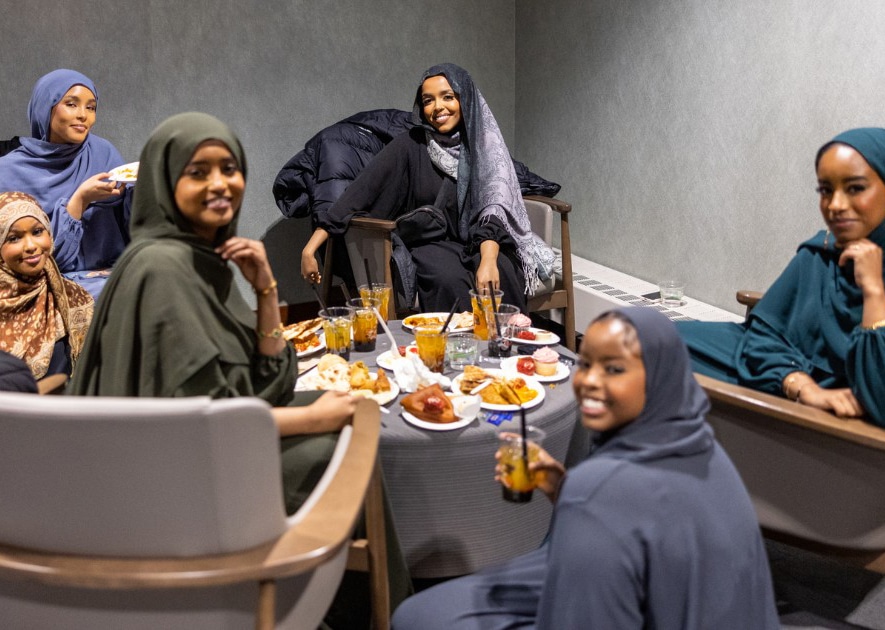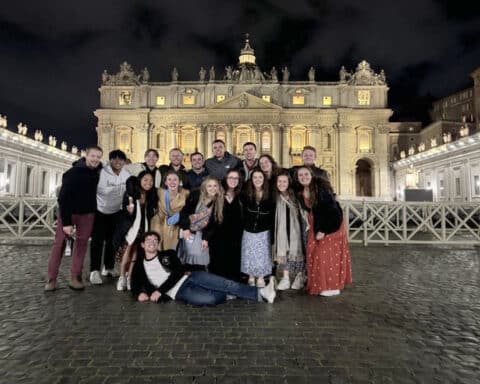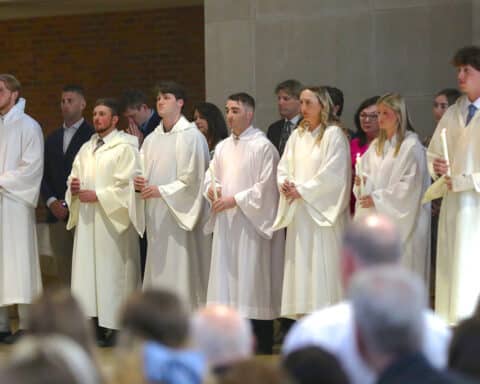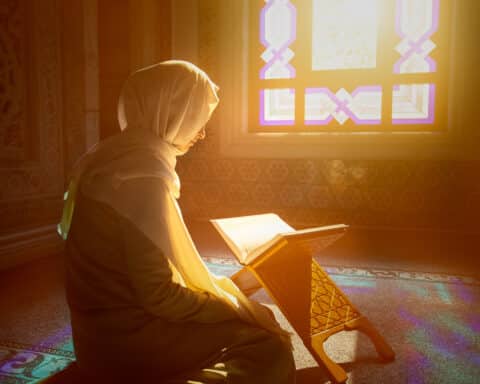In 2019, Pope Francis and the Grand Imam of Al-Azhar (Ahmad el-Tayyeb) signed the Document on Human Fraternity for World Peace and Living Together, known also as the Abu Dhabi declaration.
The two faith leaders asked that schools, universities and institutes of formation reflect on the document to help “educate new generations to bring goodness and peace to others, and to be defenders everywhere of the oppressed and of the least of our brothers and sisters.”
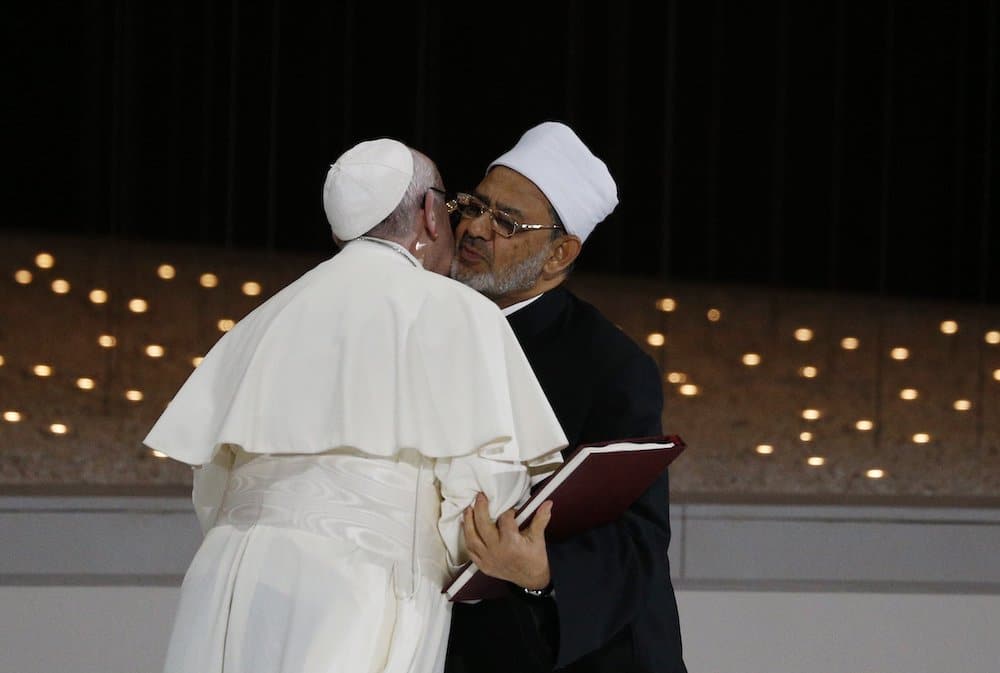
That mission has long been part of Catholic higher education where the values of all faiths are respected.
On the same campuses where crucifixes hang in classrooms, there are food services that accommodate dietary restrictions for the growing Islamic student populations.
“Some people think that our hospitality or accommodations for Muslim students and colleagues are some sort of exception to what it means to be Catholic,” said Father Kevin Nadolski, OSFS, vice president of mission at DeSales University in Center Valley, Pennsylvania. “What I am saying is that it’s essential to what it is to be Catholic.”
Charism of hospitality
St. Francis de Sales is the university’s patron saint and his spiritual colleague is St. Jane de Chantal. Both are notable contributors to Christian and Salesian spirituality whose core value and charism are hospitality.
When they founded the religious community Visitation of Holy Mary in the early 17th century, they welcomed older, handicapped and other women who at the time were not welcome to religious life. They saw those women being marginalized.
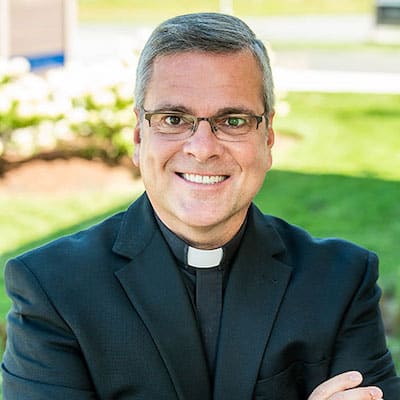
“So part of our spirituality is to bring folks on the margins into the center,” Father Nadolski said. “As a primarily Christian context at DeSales University, non-Christian students or non-Christian colleagues may not feel like they are in the center. Our gesture, for example, is that we have a dedicated prayer room that is not our chapel, and is largely for our Muslim students. We also highlight that in his writings and speaking about Catholic higher education, Pope Benedict called Catholic leaders to be responsible for the faith development of all, not just Christians or Catholics.”
The students in his class Introduction to Catholic Theology, he noted, are very engaged, ask questions, and show genuine curiosity and openness.
“The first value,” he said about common ground, “is that we worship the one true God. That goes without saying. The second would be that we honor each other’s sacred text. Another is the fundamental respect for human dignity and the mutual regard to Catholic social teaching. I see Muslim students resonating with that social ethic.”
One of the students invited the university president and a priest to her mosque and for a meal and to meet her family and friends.
“It highlighted on a very human level their friendship,” Father Nadolski said. “It was a very normal human experience.”
Accommodations to fasting
During the Islamic holy month of Ramadan, the cafeteria at the University of St. Thomas in St. Paul, Minnesota, accommodates Muslim students who observe fasting from dawn to sunset.
The dining service provides them with packaged cold breakfasts they can eat before sunrise and a serving of dates for the tradition to break fast at sundown before the meal known as iftar begins.
“Last year, we provided about 800 meals, and the year before, about 1,200,” said Sadaf Shier, a native of Pakistan and the chaplain for about 250 Muslims on campus.
There’s a welcoming space for all faiths in an area that connects two new dorms to a chapel, and designated prayer spaces that are especially used by Muslim students.
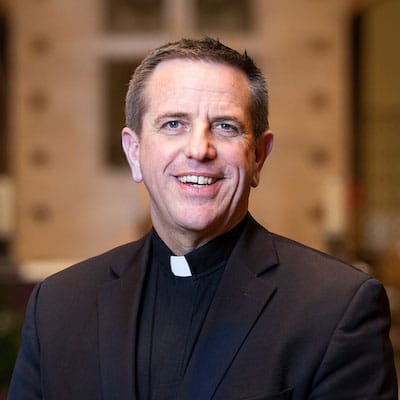
“We are getting an increasing number of Muslim students because of our big population of Somalis in the Twin Cities area,” said Father Chris Collins, SJ, vice president of mission. “I think that parents are attracted to sending their kids to faith-based universities where faith is respected, which is a priority to our university. That’s a pretty common reason, that moral formation and respecting faith is not a foreign concept.”
It’s one of the foundational missions of Catholic education to be in a dialogue of support to help people of all faiths to appreciate their own and those that are different. And while doing so, the Catholic institutions maintain the norms and teachings of the Church.
Church’s mission of interreligious dialogue
“The Vatican has a whole set of offices dedicated to interreligious dialogue and it’s good for us to be in a dialogue with the faith commitment of other people,” Father Collins said. “It’s part of being a Catholic university to support the faith life of students from other religious traditions, and it’s also part of being a Catholic university that this is not a departure from being Catholic.”
Pope John Paul II in August 1990 issued Ex Corde Ecclesiae, an apostolic constitution on Catholic higher education. The document described the identity and mission of Catholic colleges and universities and provided general norms to help fulfill that vision.
In response, the University of St. Thomas in 1992 founded the Center For Catholic Studies that focuses on cultivating an interdisciplinary Catholic vision.
“We’re trying to live out the Church’s mission that way to be in dialogue and support in living a life of faith in an increasingly secularized world,” Father Collins. “It’s about meeting people where they are and trying to support them. When you enter into those places of dialogue, that also helps Catholics and other Christians to appreciate their own faith, as well.”
Shier noted that there’s a growing awareness and understanding among different religions that leads people to be supportive of each other.
“I come from a belief that mostly, human beings want to support each other. It’s just that lack of understanding that creates walls,” she said. “People in a Catholic school understand the value of God and the connection with God. When that common goal is present and we all want to be connected to God, it becomes easier for me to advocate for students and easier for faculty and staff to understand the needs of other faiths, and easier for our students to advocate for themselves as well.”
Christian students are welcome to learn about Ramadan and other Muslim practices and beliefs through workshops, conversation sessions, videos and religious material that promote celebratory and inclusive information.
“We also post signs that say Blessed Ramadan to our Muslim community,” Shier said. “We put them in different places for those who don’t know of this blessed time, or who want to celebrate with Muslims and want to accommodate us during this month.”
Lisan Hasnain of India is a senior studying entrepreneurship and communications. After a year as a general member of the Muslim Students Association, he took a leadership role on the board and is now vice president. He attends Friday prayer services hosted by the campus ministry and also sits on the interfaith council that addresses the needs of students, staff and faculty with different faith backgrounds.
Finding common ground
“The main common ground stems from the basic concept of humanity,” he said. “I think it starts with respecting and showing kindness to everyone regardless of religious background. Another common ground at St. Thomas is that everyone wants to build community. I also find common ground through dialogue with others about Islam, which allows me to reflect about my own practices and belief.”
About 20 to 25% of students at Benedictine University in Lisle, Illinois, and the Mesa, Arizona, campus are Muslim.
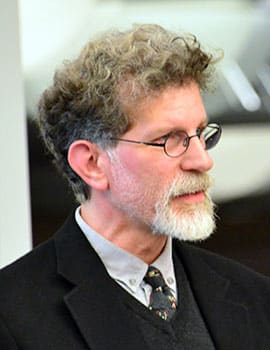
“We feel very blessed that we are an institution that attracts people of different faiths,” said Chief Mission Officer Peter Huff. “We see this as a strength and as something that really enhances our own Catholic identity and helps prepare students for service in a world where they will encounter people of many different faiths and persuasions.”
In addition to the university’s excellence in academic programs, he added that there’s a sense that the university atmosphere takes faith and the dialogue of faith and reason seriously, and that there’s respect for those of different backgrounds.
Catholic identity remains prominent
The Catholic identity remains prominent with required theology courses and interdisciplinary seminars that focus on Catholic and Benedictine traditions including the Rule of St. Benedict and Catholic social teachings.
“We think that this is a great example of putting traditions into action,” Huff said. “One cardinal part of The Rule is welcoming the guests as Christ, and we make sure that theme cuts across all campus activities and philosophies or organizations. Students are very familiar with the theme of respecting each other and listening with the ear of your heart — the first part of The Rule — and that informs all of our actions in terms of interfaith dialogue.”
Other events for students work towards enhancing the Benedictine identity. An annual day-long teach-in reinforces student engagement with Catholic social teaching and applying it with their own experiences. The Sister Judith Ann Heble Center for Benedictine Values puts on a program on spirituality and Catholic social teaching that attracts all members of the university community. The Faith and Reason Symposium reflects on John Paul II’s encyclical Fides et Ratio (“Relationship Between Faith and Reason“).
“It’s amazing to hear the representation, comments and questions from students and faculty who are Catholic and students and faculty who come from different perspectives all focusing on faith and reason,” Huff said. “The Muslim students attend these events with great pride and great enthusiasm.”
On March 1, the university welcomed Dr. Joseph Foy as its new president. The installation involved student volunteers of all faiths and universal prayers in different languages.
“There were some parts where Muslim students could not participate, and some parts where I as a Catholic would not be able to participate in other faith traditions,” Huff said, adding that, “All of it was a great sense of solidarity, togetherness and pride in our shared mission and vision.”
At La Roche University, founded by the Sisters of Divine Providence in Pittsburgh, Pennsylvania, international students, including those of the Islamic faith, comprise a diverse 20% of the 1,200 student body. Incoming students take a class in the La Roche Experience that focuses on commonalities among religions and explores issues of social justice, service to others and acceptance of others.
The mission statement emphasizes the moral component of education and offers an understanding of the Catholic tradition and other religious traditions to students who want to explore their faith in an academic environment.
“I think that our Muslim students feel comfortable to be who they are,” said Natasha Garrett, Ph.D., director of International Student Services.
Their holy days and dietary restrictions are recognized on campus, and there are shared prayer spaces and interfaith services. They share, too, with the Catholic and Christian community the common grounds of strong family values, compassion, justice, peace, service and ethics that are the foundations of the university.
“I think the Muslim students are attracted to La Roche because we understand Catholicism in terms of social justice and inclusivity, and students respond to that,” Garrett said. “Our mission statement says it very well.”

